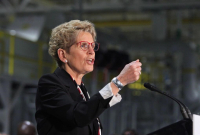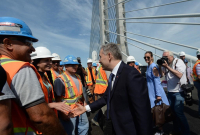Support strong Canadian climate journalism for 2025
A proposed high-speed rail link connecting Vancouver, Seattle and Portland would cut the travel time between each city to under an hour and dramatically boost the economy of the entire region, a new report concludes.
The Washington State Department of Transportation has released a 400-page business case for the transportation link, which is also supported by the governments of British Columbia, Oregon and Microsoft Corp.
"The ability to travel each segment between Seattle, Portland, and Vancouver in less than an hour will revolutionize the way we live, work, and play in the Pacific Northwest," says Washington Gov. Jay Inslee in the report.
"Moreover, it helps us preserve the natural beauty and health of our region by enabling faster, cleaner, and greener trips between our region's largest cities."
The report prepared by engineering consulting firm WSP says it currently takes about two hours and 40 minutes to drive from Seattle to Vancouver, or more than four hours by bus or train. The driving time from Portland to Seattle is about three hours, or about three and a half hours by bus or train, it says.
The new high-speed system would feature frequent trains running at speeds as high as 400 kilometres per hour and include stops in between the major cities with connections to other transportation, says the report.
It suggests intermediary stops in the Metro Vancouver city of Surrey as well as in the Washington communities of Bellingham, Everett, Tacoma, Olympia and Kelso, among others, and says these stops would only result in "minor" time penalties.
It says the annual ridership is projected to exceed three million, with fare revenues estimated at more than US$250 million, which could result in one of the best performing rail services in North America.
The rail link is also expected to produce a stronger, more productive region as more businesses and jobs locate in the area due to dramatically improved access to housing, jobs, schools and other destinations.
A previous report estimated that as many as 160,000 permanent new jobs in the wider economy could be unlocked by the high-speed link, generating as much as US$355 billion in additional economic activity.
The system would result in a more affordable region, as residents benefit from easier access to housing and wider availability of higher-paying jobs and opportunities, the new report says.
The report adds that the link would contribute to a cleaner environment by shifting trips to more sustainable modes, reducing carbon emissions, protecting habitats and improving the resilience of the transportation network.
"The need for continued additional transportation infrastructure investment in the Cascadia megaregion is clear — crowded roads, congested airports and limited intercity rail service constrain the mobility of residents, businesses, and tourists," the report says.
"Vancouver, Seattle and Portland have the fourth, sixth, and tenth-most congested roads in North America, respectively. Airport delays are making air travel increasingly unreliable, and the travel time and frequency of intercity rail service are not competitive for most trips."
Microsoft is headquartered in Redmond, Wash., near Seattle, and its CEO Brad Smith is quoted in the report as saying in 2018 that the transportation link would strengthen the region.
"Our ability to compete in the world's economy will be enhanced dramatically by having a region that is six million inhabitants strong versus two or three regions of three million each," he says.
Inslee and B.C.'s then-premier Christy Clark signed a memorandum of understanding in 2016 to work together to create a new technology corridor, including a high-speed ground transportation system.
A feasibility study in 2017 estimated capital costs ranging from US$24 billion to US$42 billion.
The Washington legislature approved funding in 2018 to conduct a business case analysis, and it was joined by Oregon, B.C. and Microsoft as funding partners and oversight contributors.
B.C. committed $300,000 in 2018 to develop the business case and in February this year, committed an additional $300,000 to the next exploratory steps.
The province's Jobs Minister Bruce Ralston said in a statement Monday that the transportation link could have huge economic benefits and draw new companies to the region.
"Improving the connectivity in the Pacific Northwest region presents enormous potential for job creation, economic growth and environmental benefits on both sides of the border."





Comments
Why enable all the Canadians who go down to shop anyways ? Perhaps not such an incentive as they want the cheap gasoline also .